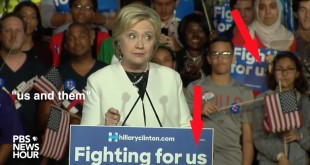Chutzpah
[hoo t-spuh, khoo t-]noun, Slang.
- unmitigated effrontery or impudence; gall.
- audacity; nerve.
The classic definition is that given by Leo Rosten: “that quality enshrined in a man who, having killed his mother and father, throws himself on the mercy of the court because he is an orphan.”
A Modern Example
President Obama gave a speech last week at the annual meeting of the International Association of Chiefs of Police in which he talked about the difficult conditions under which police across the country are forced to work. Specifically he addressed the tension and mistrust between police and the communities they serve.
In the speech he said that police are “scapegoated” for the broader problems in society. Who did he blame for this scapegoating? The Black Lives Matter movement? No, they were not mentioned in his speech. Hollywood celebrities? Nope.
His primary targets were the news media and political candidates. Here are his exact words on the subject:
“I reject any narrative that seeks to divide police and communities that they serve. I reject a storyline that says when it comes to public safety there’s an “us” and a “them” –- a narrative that too often gets served up to us by news stations seeking ratings, or tweets seeking retweets, or political candidates seeking some attention. I know that’s shocking that political candidates do that.”
What he did not mention was his own record of commenting on alleged cases of police misconduct for which the facts had not been ascertained – essentially commenting on videos that he has seen in the news media. It’s important to remember that whatever a president says publicly on any controversial subject is prominently reported in the media and draws much attention to that subject – and rightly so. Below is a sampling of the president’s remarks:
1. Trayvon Martin case
March 23, 2012 – Commenting on the death of Trayvon Martin, which had happened 25 days earlier, and more than a year before the related trial.
“You know, if I had a son, he’d look like Trayvon,” (speaking of Trayvon Martin’s parents) “I think they are right to expect that all of us as Americans are going to take this with the seriousness it deserves, and we are going to get to the bottom of exactly what happened.”
2. Michael Brown case
August 12, 2014 – Commenting on the death of Michael Brown, who was shot and killed by Ferguson, Missouri police officer Darren Wilson 3 days earlier.
“The death of Michael Brown is heartbreaking, and Michelle and I send our deepest condolences to his family and his community at this very difficult time. As Attorney General Holder has indicated, the Department of Justice is investigating the situation along with local officials, and they will continue to direct resources to the case as needed.”
September 28, 2014 – Commenting again on the death of Michael Brown.
“And we have to close the justice gap — how justice is applied, but also how it is perceived, how it is experienced. Eric Holder understands this. That’s what we saw in Ferguson this summer, when Michael Brown was killed and a community was divided. We know that the unrest continues. And Eric spent some time with the residents and police of Ferguson, and the Department of Justice has indicated that its civil rights investigation is ongoing.
Now, I won’t comment on the investigation. I know that Michael’s family is here tonight. I know that nothing any of us can say can ease the grief of losing a child so soon. But the anger and the emotion that followed his death awakened our nation once again to the reality that people in this room have long understood, which is, in too many communities around the country, a gulf of mistrust exists between local residents and law enforcement.
November 24, 2014 – Commenting on the decision of the St. Louis County grand jury not to indict the officer who shot Michael Brown:
“There are Americans who agree with it, and there are Americans who are deeply disappointed — even angry,” Obama said. “It’s an understandable reaction.”
March 4, 2015, after a federal investigation cleared officer Darren Wilson of any wrongdoing.
“We may never know exactly what happened, but Officer Wilson, like anybody else who is charged with a crime, benefits from due process and a reasonable doubt standard, and if there is uncertainty about what happened, then you can’t just charge him anyway just because what happened was tragic.”
This was not exactly a ringing endorsement of Officer’s Wilsons blamelessness, even though the investigation clearly showed that the forensic and credible eyewitness accounts (meaning from actual eye witnesses) backed up the officer’s story. In all of President Obama’s statements on the case, there has never been a hint of sympathy for Darren Wilson, who lost his job and is essentially in hiding because of death threats to him and his family.
3. Eric Garner case
December 9, 2014 – Commenting on the decision by a New York grand not to indict the police officer involved in the death of Eric Garner in New York City.
“It used to be folks would say, well, maybe blacks are exaggerating, maybe some of these situations aren’t what they describe. But we’ve now seen on television for everybody to see — gives us an opportunity, I think, to finally have the kind of conversation that’s been a long time coming.”
Note that he is citing a video that was widely shown the news media, not any facts about the prevalence of such occurrences.
4. Freddie Gray case
April 28, 2015 – Commenting on the Freddie Gray arrest video and subsequent unrest in Baltimore. The trials of the police officers involved have not yet begun as of this writing.
“Since Ferguson and the task force that we put together, we have seen too many incidences of what appears to be police officers interacting with individuals — primarily African-American, often poor — in ways that raise troubling questions. It comes up, it seems like, once a week now. Or once every couple of weeks. “
Here again he was not citing a statistical trend – he was reacting to the videos that he had seen in the media.
The president had taken a stance in each of these cases of assuming some police (or civilian patrol) misconduct, and barely acknowledged the case (Ferguson) in which his own justice department exonerated the officer. With all of his comments on individual cases, he has never attempted to put them into a larger context by quoting the available data on the subject.
Yet in the Chicago speech last week he used statistics to attempt to bolster his argument that an anti-police movement has not led to an increase in crime. The quote is below, with my comments in bold:
“Now, first, we do need to get some facts established. So far, the data shows that overall violent crime rates across the nation appear to be nearly as low as they were last year (meaning they have increased) and significantly lower than they were in previous decades. It is true that in some cities, including here in my hometown of Chicago, gun violence and homicides have spiked -– and in some cases they’ve spiked significantly. But the fact is, is that so far at least across the nation, the data shows that we are still enjoying historically low rates of violent crime. Moreover, over the past few years, the number of police officers shot and killed in the line of duty has fallen to their lowest levels in decades. In fact, 2013 (which was before most of these incidents occurred) saw the fewest cops shot and killed in the line of duty since 1887.”
What he fails to note is that in 3 cities where the anti-police protests have been the most active – Milwaukee, St. Louis, and Baltimore – the murder rates for 2015 are up from last year 76%, 60%, and 56% respectively.
It’s true that media uses sensational videos to get ratings and imply the existence of a trend in the absence of supporting facts. These videos also give opportunistic activist groups the ability to draw attention to themselves and raise money. And the president was correct in saying that politicians use these incidents to their advantage – he just forgot to include himself on that list. Chutzpah.
 Thought Widget get learnt
Thought Widget get learnt



